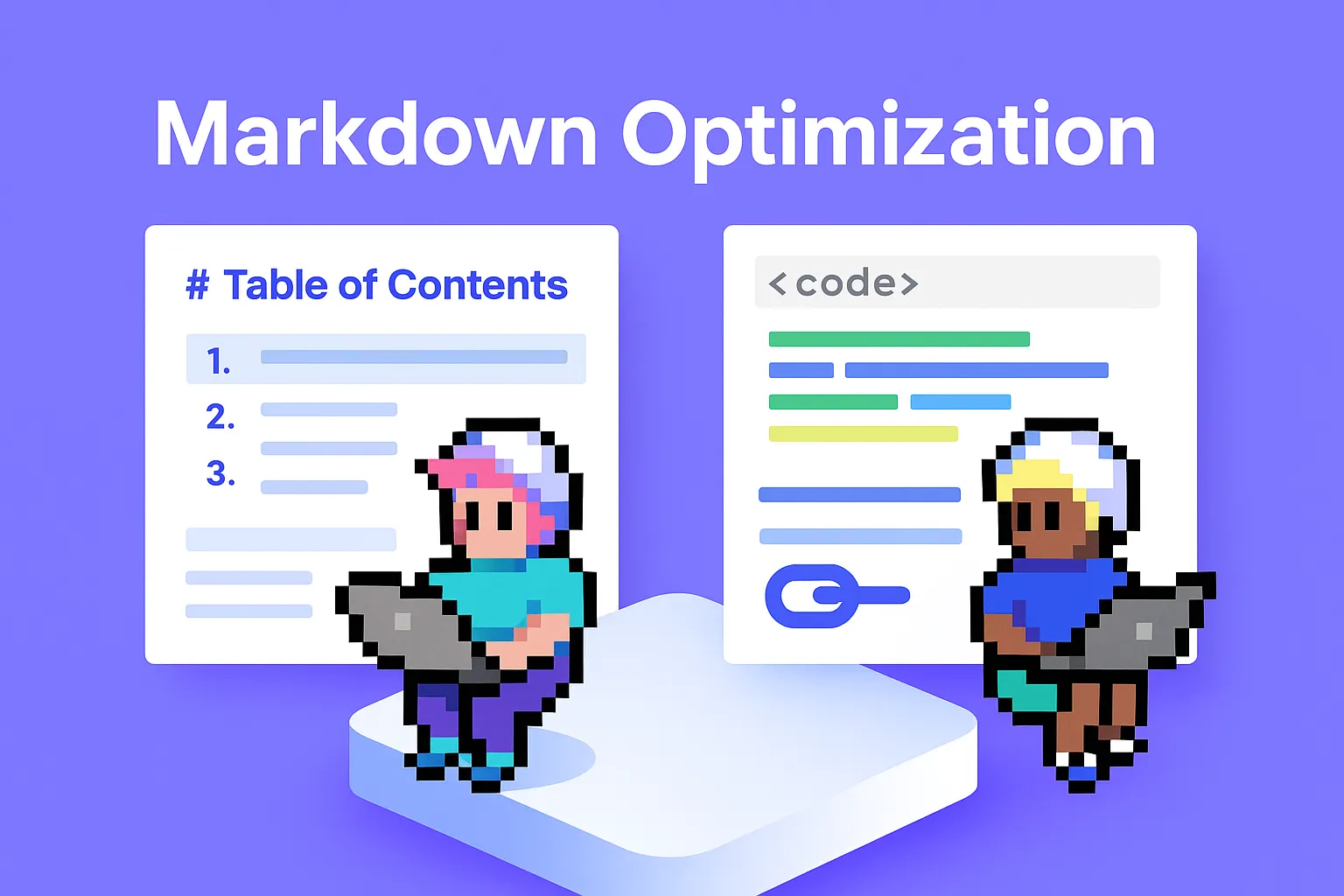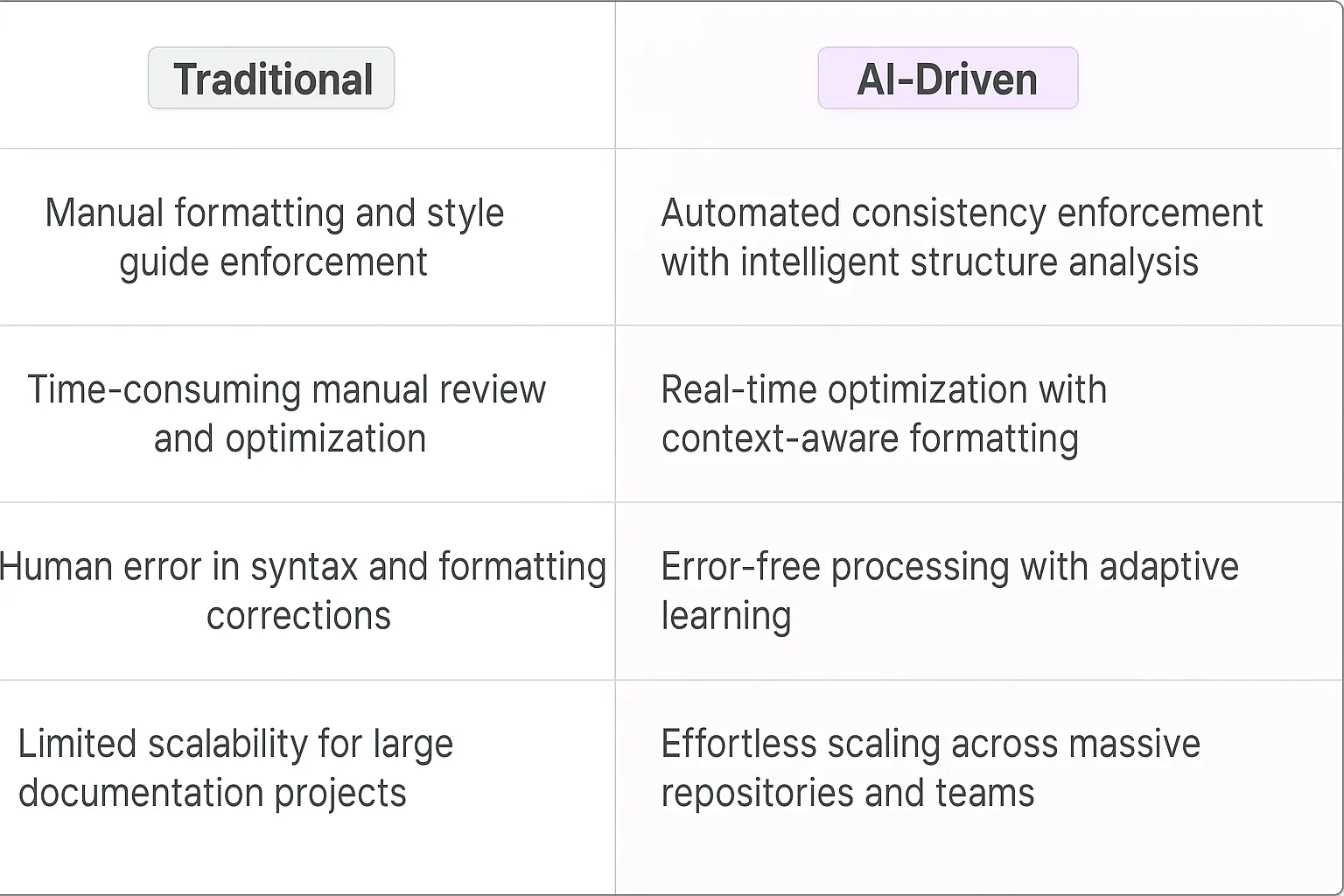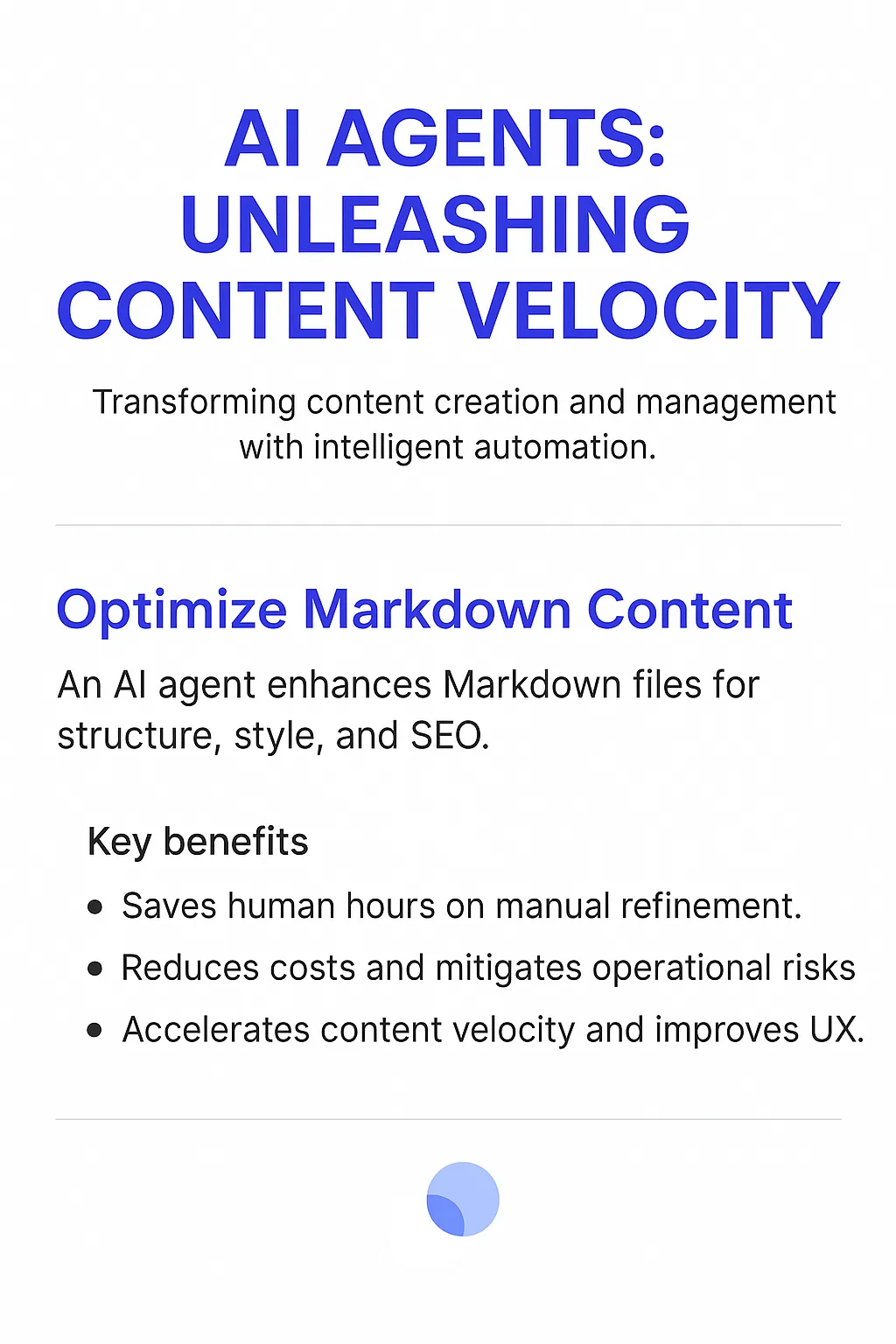Markdown Optimization AI Agents
Unveiling the Power of AI-Driven Markdown Enhancement
What is Markdown Optimization?
Markdown Optimization is the process of refining and enhancing Markdown-formatted content for improved readability, structure, and effectiveness. It goes beyond basic syntax corrections, diving into the realm of semantic improvements and user experience enhancements. Think of it as giving your content a brain upgrade, not just a facelift.
Key Features of Markdown Optimization
1. Intelligent Structure Analysis: AI agents dissect document structure, identifying areas for improvement in hierarchy and flow.
2. Context-Aware Formatting: These digital teammates understand the content's context, applying appropriate formatting that enhances comprehension.
3. Style Consistency Enforcement: Say goodbye to rogue formatting. AI ensures your style guide is followed religiously across all documents.
4. SEO Enhancement: Smart optimization for search engines without sacrificing readability for human users.
5. Dynamic Link Management: Automated verification and suggestion of both internal and external links to boost content value.
6. Code Block Refinement: Language detection and syntax highlighting for cleaner, more readable code snippets.
7. Adaptive Learning: The AI evolves with your content, continuously improving its optimization strategies based on usage patterns and feedback.
These tools are particularly valuable for developers and teams focused on content creation, providing the foundation for consistent, high-quality documentation across projects.

Benefits of AI Agents for Markdown Optimization
What would have been used before AI Agents?
Before AI agents entered the scene, Markdown optimization was a manual grind. Developers and writers would spend hours poring over their content, tweaking syntax, and fine-tuning formatting. It was like trying to perfect a novel by hand-editing each page – tedious, time-consuming, and prone to human error.
We'd rely on static style guides, peer reviews, and our own keen eyes to catch inconsistencies or improve readability. But let's face it, even the most caffeinated coder misses things. And don't get me started on the endless debates over whether to use asterisks or underscores for emphasis. It was the wild west of markup languages, with each project potentially following its own rules.
What are the benefits of AI Agents?
Enter AI agents for Markdown optimization. These digital teammates are game-changers, and here's why:
1. Consistency on steroids: AI agents can enforce style guidelines across entire codebases or documentation sets with relentless precision. No more "oops, I forgot to capitalize that header" moments. They're like having a style guide ninja working 24/7.
2. Speed that makes your head spin: What used to take hours now happens in seconds. AI agents can scan, analyze, and optimize Markdown faster than you can say "pull request." This isn't just about saving time; it's about unlocking new levels of productivity.
3. Learning and adapting: Unlike static tools, AI agents get smarter over time. They learn from your preferences, project-specific nuances, and even industry trends. It's like having a junior dev who becomes a 10x engineer overnight, every night.
4. Contextual understanding: AI agents don't just blindly apply rules. They understand context, making intelligent decisions about formatting and structure that enhance readability and SEO. They're not just following orders; they're thinking about the end-user experience.
5. Collaboration boost: By handling the nitty-gritty of Markdown optimization, AI agents free up humans to focus on what they do best – creating killer content and solving complex problems. It's like having a personal assistant for your brain, letting you operate at a higher level.
6. Error reduction: Let's face it, we all make mistakes. AI agents catch the typos, the misplaced links, and the formatting faux pas that slip past human eyes. They're the safety net that keeps your content polished and professional.
7. Scalability: As your project grows, so does the challenge of maintaining consistent Markdown. AI agents scale effortlessly, whether you're working on a personal blog or a massive open-source project with thousands of contributors.
The bottom line? AI agents for Markdown optimization aren't just tools; they're force multipliers. They're taking the grunt work out of content creation and letting us focus on what really matters – building amazing products and telling compelling stories. In the world of tech, where every efficiency gain can mean the difference between market leader and also-ran, these AI agents aren't just nice to have. They're becoming essential to staying competitive.

Potential Use Cases of AI Agents with Markdown Optimization
Processes
Markdown optimization is a game-changer for content creators and developers. AI agents specializing in this area can transform the way we approach documentation, readme files, and even blog posts. These digital teammates excel at enhancing readability, structure, and overall effectiveness of markdown content.
One key process where AI shines is in the automated refinement of existing markdown files. It can analyze the current structure, identify areas for improvement, and suggest changes that align with best practices. This isn't just about making things look pretty – it's about creating a seamless reading experience that guides users through complex information effortlessly.
Another process ripe for AI intervention is the conversion of plain text or poorly formatted content into well-structured markdown. This is particularly valuable for teams migrating legacy documentation or dealing with content from various sources. The AI can intelligently parse the input, recognize headings, lists, and code blocks, and output clean, consistent markdown that adheres to the team's style guide.
Tasks
When it comes to specific tasks, markdown optimization AI agents are versatile powerhouses. They can tackle everything from the mundane to the complex, freeing up human creativity for higher-level thinking.
One task where these agents excel is in generating table of contents. They can analyze the document structure, extract headings, and create a linked table of contents that enhances navigation. This is especially crucial for long-form content or technical documentation where users need to quickly find relevant sections.
Another valuable task is the optimization of code blocks within markdown. The AI can detect the programming language, apply appropriate syntax highlighting, and even suggest improvements to the code formatting. This ensures that technical content is not only readable but also visually appealing and easy to understand.
These digital teammates can also assist in link management. They can verify the validity of both internal and external links, suggest relevant internal cross-references, and even propose external resources that could enrich the content. This not only improves the user experience but also boosts the SEO value of the markdown content.
Lastly, AI agents can be instrumental in maintaining consistency across large markdown repositories. They can enforce style guidelines, standardize formatting, and even suggest improvements to ensure a cohesive voice across all documentation. This is particularly valuable for open-source projects or large organizations with multiple contributors.
The potential of AI in markdown optimization is vast and largely untapped. As these digital teammates become more sophisticated, we're likely to see a shift in how we approach content creation and management. The future of markdown isn't just about writing – it's about crafting experiences that are intuitive, engaging, and infinitely scalable.

Industry Use Cases
AI agents specializing in Markdown optimization are reshaping how various sectors approach documentation and content creation. These digital teammates aren't just fancy text editors; they're game-changers that bring a new level of efficiency and consistency to the table. Let's dive into some real-world scenarios where these AI-powered tools are making waves:
Tech companies are leveraging these agents to maintain pristine documentation across sprawling codebases. In the fast-moving world of software development, where every second counts, these AI helpers ensure that README files, API docs, and internal wikis stay crisp, clear, and up-to-date without eating into dev time.
Content creators and digital marketers are tapping into the power of Markdown optimization agents to craft SEO-friendly blog posts and landing pages at scale. These AI teammates act as silent editors, fine-tuning content structure and readability while preserving the writer's unique voice.
In academia, researchers are using these tools to format complex papers and theses with precision. The result? More time for groundbreaking discoveries, less time wrestling with formatting guidelines.
Each of these use cases demonstrates how AI is quietly revolutionizing workflows across industries, proving that sometimes, the most impactful innovations are the ones that seamlessly integrate into our daily grind.
Retail's Markdown Maestro: AI-Driven Pricing Precision
Let's talk about the retail industry's perennial challenge: markdown optimization. It's a delicate dance of timing, psychology, and cold, hard numbers. Enter the Markdown Optimization AI Agent – the digital teammate that's about to change the game for retailers everywhere.
Think of this AI as your hyper-intelligent pricing strategist. It's not just crunching numbers; it's reading the pulse of consumer behavior, market trends, and inventory levels in real-time. This digital teammate is constantly learning, adapting, and fine-tuning its strategies to maximize revenue while minimizing waste.
Here's where it gets interesting: The AI doesn't just react; it predicts. It's looking at historical data, sure, but it's also factoring in things like social media sentiment, weather patterns, and even upcoming events that could impact buying behavior. It's like having a crystal ball, but one that's powered by algorithms instead of mystical energy.
But the real magic happens in its execution. This AI isn't just suggesting markdown strategies; it's implementing them across channels in real-time. It's adjusting prices on your e-commerce platform, sending updates to in-store digital price tags, and even coordinating with your marketing team to push targeted promotions to the right customers at the perfect moment.
The result? A retail environment where markdowns are no longer a necessary evil, but a strategic tool for driving sales and customer loyalty. It's the difference between a fire sale and a carefully orchestrated price symphony.
And here's the kicker: As this AI learns and evolves, it starts to uncover patterns and insights that humans might miss. Maybe it discovers that certain products sell better when marked down on Tuesdays, or that bundling slow-moving items with popular ones at a slight discount moves inventory faster than traditional markdowns.
This isn't just about clearing out last season's inventory. It's about creating a dynamic, responsive pricing ecosystem that keeps your retail business ahead of the curve. It's the kind of edge that separates the retail winners from the also-rans in an increasingly competitive landscape.
So, for retailers looking to stay ahead, the Markdown Optimization AI Agent isn't just a tool – it's your secret weapon in the battle for consumer dollars. It's time to let AI take the wheel on pricing strategy and watch your margins thank you.
Travel Industry's Dynamic Pricing Dynamo: AI-Powered Revenue Optimization
The travel industry is notorious for its complex pricing structures and volatile demand. Airlines, hotels, and tour operators have long grappled with the challenge of maximizing revenue while filling seats and rooms. Enter the Markdown Optimization AI Agent for travel – a game-changer that's redefining how the industry approaches pricing strategy.
This AI isn't just another pricing tool; it's a sophisticated digital teammate that's constantly pulse-checking the entire travel ecosystem. It's ingesting and analyzing vast amounts of data – from historical booking patterns and competitor pricing to real-time events, weather forecasts, and even social media sentiment about destinations.
What sets this AI apart is its ability to create hyper-personalized pricing strategies. It's not just about blanket discounts or last-minute fire sales. This digital dynamo is crafting tailored offers for different customer segments, considering factors like loyalty status, booking history, and even browsing behavior.
The AI's real-time capabilities are where things get interesting. It's adjusting prices across all channels instantaneously, responding to sudden shifts in demand or unexpected events. A cancelled festival in a major city? The AI immediately recalibrates pricing for hotels and flights. A viral social media post about a hidden beach? Watch as the AI subtly adjusts prices for nearby accommodations.
But here's where it gets really powerful: This AI is learning and evolving with every transaction. It's uncovering counterintuitive insights that human analysts might miss. Maybe it discovers that certain routes are more price-sensitive on Thursdays, or that coupling a slight discount on business class tickets with a premium economy upgrade offer yields higher overall revenue.
The impact on customer experience is profound. Travelers are presented with offers that feel tailor-made, hitting that sweet spot between perceived value and actual cost. It's creating a win-win scenario where travelers feel they're getting a deal, while travel companies optimize their revenue.
For the travel industry, this isn't just about better pricing – it's about creating a more resilient, adaptive business model. In a world where global events can reshape travel patterns overnight, having an AI that can pivot pricing strategies in real-time isn't just an advantage – it's a necessity.
The companies that embrace this technology aren't just optimizing their current business; they're future-proofing it. They're building the kind of dynamic, responsive systems that can weather economic storms and capitalize on unexpected opportunities.
As we look to the future of travel, the lines between pricing, marketing, and customer experience are blurring. The Markdown Optimization AI Agent isn't just a pricing tool – it's becoming the central nervous system of smart travel companies, orchestrating a symphony of data-driven decisions that keep them ahead in a fiercely competitive market.
Considerations
Technical Challenges
Implementing a Markdown Optimization AI Agent isn't a walk in the park. It's more like trying to teach a robot to write poetry while juggling flaming torches. The first hurdle? Parsing the wide variety of Markdown flavors out there. It's like dealing with a bunch of dialects of the same language – they're similar, but just different enough to trip you up.
Then there's the challenge of maintaining the original document structure while optimizing. It's a delicate balance, like performing surgery on a house of cards. You want to improve readability and efficiency, but one wrong move and you could collapse the entire semantic structure of the document.
Let's not forget about handling edge cases. Markdown can get pretty wild with custom extensions and non-standard uses. Your AI needs to be smart enough to recognize these outliers and not turn them into digital spaghetti.
Operational Challenges
On the operational side, we're looking at a different beast altogether. First up: integration. How do you seamlessly weave this AI into existing workflows without causing a revolt among your developers? It's like trying to introduce a new player to a well-oiled sports team mid-season.
Then there's the question of performance. Your AI needs to be fast – really fast. In the world of development, waiting for an AI to optimize your Markdown is about as fun as watching paint dry in slow motion. If it's not near-instantaneous, developers will stick to their tried-and-true manual methods.
Let's talk about customization. Every team, every project has its own Markdown style guide. Your AI needs to be flexible enough to adapt to these preferences, but robust enough to maintain its core optimization principles. It's like trying to be a chameleon while also being a rock – not exactly a natural combination.
Lastly, there's the ongoing challenge of keeping the AI up-to-date with the latest Markdown trends and best practices. The digital world moves fast, and your AI can't afford to fall behind. It's a never-ending game of catch-up, like trying to hit a moving target while riding a unicycle.
For the dev team, these considerations require careful planning and strategic implementation to ensure smooth adoption and maximum benefit.
The Future of Content: Embracing AI-Driven Optimization
Markdown Optimization AI Agents are not just tools; they're catalysts for a content revolution. They're dismantling the barriers between idea generation and polished execution, allowing creators to focus on what truly matters - the substance of their work. As these digital teammates continue to evolve, we're witnessing a shift from mere efficiency gains to fundamental changes in how we approach content management and creation.
The implications stretch far beyond just cleaner documents. We're talking about a future where content adapts in real-time to user needs, where documentation becomes a living, breathing entity that grows with your product. It's a world where the line between writer and editor blurs, and where the quality bar for content is constantly rising.
For businesses, the message is clear: embrace these AI agents or risk being left behind in a sea of subpar content. For creators, it's an invitation to dream bigger, to push the boundaries of what's possible when the grunt work is handled by your digital sidekick. The future of content is here, and it's optimized, intelligent, and incredibly exciting.













